- Home
- Kate DiCamillo
Beverly, Right Here Page 3
Beverly, Right Here Read online
Page 3
Mr. Denby pointed a finger at Beverly. “You look familiar,” he said.
“You hired her,” said Freddie. “Yesterday. She’s busing tables. She’s not waiting tables. She’s busing them. And she has on the same clothes that she had on yesterday, which seems kind of gross if you ask me.”
Mr. Denby snapped his fingers. “You’re Beverly Anne,” he said.
“Right,” said Beverly. “I’m Beverly Anne.”
“Let’s get you an apron,” said Mr. Denby.
The apron was long and green. It had a big C on the front of it. Mr. Denby put the apron over Beverly’s head, and then tied it in the back. She could hear him humming. His breath came out in small gusts that smelled like toothpaste and fish.
“There you go,” said Mr. Denby. He patted her on the shoulder. “You’re all set. Freddie will show you the ropes. I’m going to head to the office and give my girls a call and wish them a happy Monday.”
“Today’s Tuesday,” said Freddie.
“Thank you, Freddie,” said Mr. Denby. He walked back to his office.
“Now,” said Freddie. She turned and looked at Beverly. “What happens is I wait on the tables, and you pick up the dirty dishes and put them in the bucket, and you take the bucket back to the kitchen and give it to Charles, who washes the dishes. Also, you fill up water glasses sometimes, if there’s not enough water in them. It’s not complicated. But the guy before you sure thought it was. What was his name? I can’t remember.”
“Right,” said Beverly.
“Listen,” said Freddie. “I have to tell you that I might be a waitress right now, but I also have a real job — modeling with the Klezmit Agency, which is a really famous agency and everything. Right now, I’m modeling underwear, but the underwear job will lead to modeling clothing, and the clothes-modeling job will lead to Hollywood once a movie director sees me in a magazine. So, what I’m saying is that I will not be a waitress forever, and maybe you could be the Mr. C’s waitress someday.”
Beverly stared at Freddie.
“What?” said Freddie. “You don’t believe me?”
“You model underwear?” said Beverly.
Freddie narrowed her eyes. She said, “What is your personal dream?”
“I don’t have a personal dream.”
“That right there is your mistake,” said Freddie. “That is dead-end, one-road thinking. You have to engage in open-ended, multi-road thinking.”
“Right,” said Beverly. “Where’s the bucket to put the dishes in?”
Freddie sighed. “Follow me.”
They went through the dining room with its blue chairs and blue tablecloths and its window onto the blue ocean, and through a swinging door into the kitchen.
“Okay,” said Freddie. “This is the kitchen. And that is Charles.” She pointed at a short, broad-shouldered man wearing a green knit cap.
“Hey,” said Charles. He looked up at Beverly and then down at the floor.
“Charles was a big-deal college football player,” said Freddie. “But then something happened, right?”
“Tore my tendon,” said Charles without looking up.
“Right,” said Freddie. “He tore his tendon and now he washes the dishes, and that’s the way life goes if you engage in dead-end, one-road thinking like I was just talking about earlier.”
“Charles does a lot more than wash the dishes,” said a gray-haired woman who was standing at the stove. “He does a whole lot of everything around here. Charles is indispensable. That’s what he is. And Charles is getting back on his feet. Right, Charles?”
“Right,” said Charles. “I guess.”
“That’s Doris,” said Freddie. “She’s the cook. She cooks the fish, so she thinks she’s in charge.” Freddie rolled her eyes. “Okay. Anyway. Charles and Doris, this is Beverly. She’s going to bus tables.”
Doris looked Beverly in the eye. Beverly stared back.
“Beverly,” said Doris.
“Right,” said Beverly.
“I had an aunt named Beverly. She was one smart cookie. You couldn’t get nothing past old Aunt Beverly. You be smart, too. Don’t let this Barbie doll here lie to you.”
“I haven’t lied to her about anything,” said Freddie. “I am a very truthful person.”
“Make sure she tips out with you is what I’m saying,” said Doris. “There needs to be some equity around here. Equity.”
Doris turned back to the stove. It was stainless steel, and so was the sink and the table and all the counters and the gigantic walk-in refrigerator. Everything in the kitchen shone with a muted silver light. And Doris stood at the stove in her white dress and white shoes as if she were a queen and all of it belonged to her.
The back door to the kitchen was propped open with a cement block. Hot air was coming in from outside, and a seagull was standing right outside the door, looking in at them, cocking his head from side to side.
Doris turned from the stove and snapped a towel in the direction of the bird. “Get!” she shouted.
The seagull flapped his wings. He rose, and then he settled back down in exactly the same spot and kept staring at them.
“Okay,” said Freddie. “Anyway. Here are the buckets you use for busing. Like I said, you pick up the dirty dishes and put them in the bucket, and you bring the dishes back here and Charles washes them. That’s how it works. It’s not complicated.”
“Yeah,” said Charles. He looked over at Doris. “That’s how it works. I guess.”
“That’s right,” said Doris. “That’s how it works. We don’t get paid enough to make it work. But that’s how it works for now.” And then without even turning around, she shouted, “Get on out of here!”
Beverly wasn’t sure who she was talking to.
But the seagull lifted both wings as if he intended to leave. He opened his mouth and closed it again.
And then he folded his wings and stayed where he was.
The lunch rush came in, and the kids screamed and threw fish sticks. They got up out of their chairs and ran into the little dark alcove where the video games were.
The video games pinged. They made noises of things exploding.
And the parents sat in the blue dining room and stared out at the ocean as if someone had cast a spell on them.
Beverly went from table to table with her bucket. She picked up people’s plates and put the plates in the bucket. She took the bucket back to the kitchen and gave it to Charles, who took it from her and shook his head.
“No end to it,” he said each time. “No end in sight.”
The people became a blur, and the plates became a blur, and the noise and the cigarette smoke became a blur. It was all a loud, blurry dream.
But in a way, it was good because none of it left any room in Beverly’s head for anything else. She forgot about Buddy. She forgot about his grave. She forgot about her mother. She forgot about Raymie. She forgot about the cat and the Pontiac and the flowered nightgown. She forgot about Iola and bingo.
She forgot everything.
There was nothing in her head but dirty plates and dirty forks and dirty napkins and people’s loud voices; there was nothing but the weight of the bucket in her arms and the occasional bright flash of sunlight — light that bounced off the blue ocean and entered the blue dining room and made everyone cover their eyes and say, “Oooh, that is so bright.”
Beverly’s feet hurt and her arms hurt. She had ketchup on her jeans. She smelled like fish.
It was almost three o’clock and only a few customers were left when Mr. Denby said, “Come back to the office with me, Beverly Anne.”
She followed Mr. Denby down the dark hallway to the office. The desk was still piled high with papers. The fan was on the floor, turning slowly from side to side, looking for something it had lost.
There was a safe in the wall. Its door was open.
When Beverly was a kid, she had seriously planned on growing up and becoming a safecracker. She had had a book on how to
crack a safe entitled The Safecracker’s Manual. She had read the book so many times that she had ended up memorizing parts of it, and she would go over the memorized parts in her head when she couldn’t sleep.
Safes may be compromised surprisingly often simply by guessing the combination.
That was one of the sentences she had memorized, and it popped into her head now as she stared at the open door of Mr. Denby’s safe.
“I’m paying you in cash,” said Mr. Denby, “at least until we get the paperwork filled out. And the paperwork can’t be filled out right now because I can’t seem to locate the paperwork. It’s somewhere around here.” He waved his hand at the desk. “I’m sure it’s here. But in the meantime, I’m paying you under the table. Do you understand what I’m saying, Beverly Anne?”
“No,” said Beverly.
“Good,” said Mr. Denby. He handed her fifteen dollars. “You can come back tomorrow at ten. You hustled out there today. I appreciate that, and Doris and Charles appreciate that. I’m sure that Freddie appreciated it very much, too.”
“Okay,” said Beverly, even though she doubted that Freddie appreciated anything very much.
“See you tomorrow,” said Mr. Denby.
Freddie was waiting for her when she walked out of the office. “Here,” she said. She handed her two dollars.
“What’s that for?” said Beverly.
“That’s tipping out,” said Freddie. “That’s what that old grump Doris was so excited about. So next time you see her, tell her I tipped out, okay?”
“Okay,” said Beverly.
“And one other thing,” said Freddie. “Doris thinks she’s insulting me when she calls me a Barbie doll. But it’s not an insult. It’s a compliment because Barbie is beautiful. Do you know I used to have a job as a Living Darlene?”
“Who’s Darlene?” said Beverly.
“She’s a doll, like Barbie, only not as famous. And prettier. Anyway, they hired me to be the living incarnation of Darlene, the Living Darlene, and I passed out coupons and so forth.”
“Coupons for what?” said Beverly.
“Coupons for money off toys, okay? That was my first modeling job.”
“Wow,” said Beverly.
“Well, I’m not going to work at a restaurant for the rest of my life. I’m not going to end up like grumpy old Doris or broken Charles. I have dreams. I’m going to be somebody.” She looked Beverly up and down. She said, “You could be somebody, too. You’ve got good, long legs. How tall are you, anyway? Five eight? Five nine? It’s good to be tall like that when you’re a model. They want you to be tall. And your hair is nice. Let me see your teeth.”
Beverly bared her teeth at Freddie.
Freddie took a step backward. “You’re scaring me, kind of,” she said.
“Good,” said Beverly.
“Well, you should wear some different clothes tomorrow,” said Freddie. “That’s my advice to you.”
“And you should mind your own business,” said Beverly. “That’s my advice to you.” She pushed open the door to Mr. C’s.
The sunshine hit her like a fist.
Here she was, Beverly Tapinski, alive in the world.
She left Mr. C’s, and instead of walking down A1A back to the Seahorse Court, she turned and went behind Mr. C’s, down to the water.
She walked over the sand, past the beach towels and plastic shovels and colorful umbrellas and the people who were spread out everywhere. She went right down to the water.
She took off her flip-flops and put them on the sand. She was getting ready to roll up her jeans, but then she thought,Why bother? She walked right into the water. First, it came up to her knees and then to her thighs, and then a wave came and tried to knock her over, and she let it.
She fell into the water. She rolled onto her back and stared up at the sky. She could see a tiny slice of moon suspended in the blueness.
Her father had brought her here, or to some beach near here, a long, long time ago, when a rocket was being launched into space. The two of them had left home when it was dark and gotten to the beach just when the sun was coming up.
They had sat together on the hood of the car. They had looked up at the sky. Her father kept saying, “Wait, wait. It will happen.”
And it did.
The rocket went up.
The hood of the car had been warm. Beverly had been able to feel the engine cooling off, ticking underneath them like a gigantic heart.
Her father had held her hand.
And when the rocket finally went up in the sky, he had squeezed her hand so hard that it hurt.
Pretty soon after that, he left.
He went to New York and never came back.
He slipped the surly bonds.
Stupid poem.
Poetry was nothing but words to say over a grave, something to throw into a hole in the ground.
“Wynken, Blynken, and Nod,” said Beverly out loud. That was a better poem. How did it go? She couldn’t remember. Something about sailing off somewhere.
She would ask Raymie what the rest of the poem was when she wrote to her. Raymie would know.
Beverly floated on her back in the ocean and stared at the leftover moon, and then she swam to shore.
Her flip-flops were gone.
She walked through the sand and up to the hot pavement and down the side of A1A in her bare feet. She turned off A1A and walked down the seashell drive of the Seahorse Court.
Her feet felt like they were on fire.
Iola was out in front of the trailer, watering her stupid flowers.
“Lord, child,” she said. “What have you been doing?”
“I went swimming.”
“It certainly does appear that way,” said Iola. She stared at Beverly. “Are you staying, then?” she said.
“I’m here,” said Beverly, “aren’t I?”
Iola laid down the hose and went into the trailer and got Beverly a towel. Beverly dried off as much as she could, and then she sat in the lawn chair in front of the trailer, directly in the sun. Her skin felt tight with salt water.
She closed her eyes and fell asleep and dreamed about the grave. She was standing over it, looking down into it, searching for Buddy. She couldn’t see him. The hole was empty and deep, and in the dream, she thought, Why did I dig the hole so deep?
When she woke up, her clothes were dry and stiff, and the sun was lower in the sky. She and Iola drove to Discount Dave’s, and Beverly bought three T-shirts and a pair of jeans and another pair of flip-flops.
Iola bought a toaster.
“I don’t need a toaster,” she said. “The one I got works just fine. But it’s old. And this one is so new and shiny. Isn’t it beautiful?”
“Yeah,” said Beverly. “It’s beautiful.”
When they got back from Discount Dave’s, Iola plugged in the new toaster and toasted some bread and made them both tuna melt sandwiches.
After they finished the tuna melts, it was time for bingo at the VFW.
And Beverly was still there, wasn’t she?
She was still at the Seahorse Court with Iola Jenkins.
So she was staying.
She supposed.
For now.
It turned out that you had to be eighteen years old to play bingo at the VFW.
“I’m eighteen,” said Beverly.
“You show me the identification that proves it,” said the old man at the door.
“She’s my niece, Ralph,” said Iola.
“I don’t care who she’s related to; she’s got to be eighteen to play,” said Ralph. “Them’s the rules. It’s a law, on account of gambling. Handed out by the government. And I ain’t defying the government.” Ralph had fingernails that were as yellow and thick as horns. His eyes were watery. He looked somewhere past Beverly when he talked.
“I don’t need to play,” said Beverly. “I didn’t want to play to begin with.”
“Oh, honey,” said Iola.
“I’ll wait in
the car.”
“Oh, honey,” said Iola again.
“It’s fine,” said Beverly. “I don’t care.”
And she didn’t care.
Who cared about bingo?
“Well, I can’t let you wait in the car,” said Iola. “It wouldn’t be right.”
“I’m going to wait in the car,” said Beverly. “You go inside and play.”
And before Iola could protest any more, Beverly turned and left.
The Pontiac was too hot to sit in. Beverly sat on the curb and stared up at the big VFW sign.
There was a bird’s nest in the V. Sticks and grass were hanging out of the middle of it, and some small bird was going back and forth, adding things to the nest in a busy and important way.
Beverly thought about leaving. She had the keys to the car. She could take the Pontiac and go. She could become a proper criminal — a car thief. Iola probably wouldn’t even turn her in. She would just be sad and disappointed. Which was worse somehow.
So Beverly sat on the curb outside the VFW. She stared up at the sign. She watched the bird going back and forth.
And then the sign lit itself up. First, it made a humming and crackling noise, and then, one by one, the letters came to life.
Each letter was beautiful, and when Iola came out of the VFW, Beverly didn’t get up off the curb. She just kept staring at the sign.
“There you are,” said Iola.
Beverly said nothing.
“I won $18.50,” said Iola. “And I had some fun, I suppose. But I was worried about you out here all by yourself.”
“I’m fine,” said Beverly.
“Well, $18.50 is enough for you and me to have a really good supper. Would you like some supper? We could get us some burgers and fries. What are you staring at?”
“There’s a bird’s nest up there,” said Beverly.
Iola looked up. “I can’t see it,” she said.
“Well, it’s there.”
Iola stood and stared at the sign. Beverly could see the lit-up letters — smaller, less bright — reflected in Iola’s glasses.
Beverly got up off the curb. She said, “Did you think that maybe I wouldn’t be here when you came out? That maybe I would just take the car and go?”

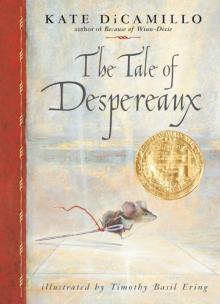 The Tale of Despereaux
The Tale of Despereaux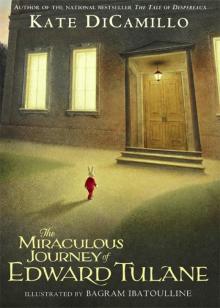 The Miraculous Journey of Edward Tulane
The Miraculous Journey of Edward Tulane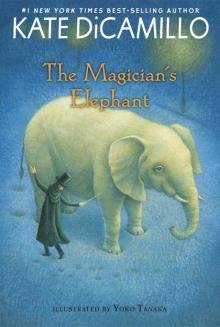 The Magician's Elephant
The Magician's Elephant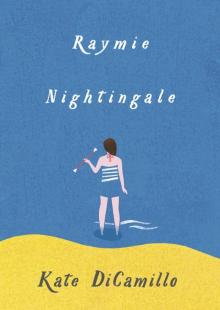 Raymie Nightingale
Raymie Nightingale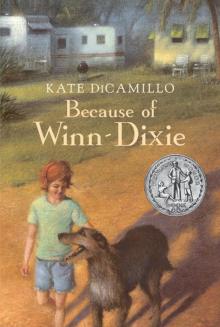 Because of Winn-Dixie
Because of Winn-Dixie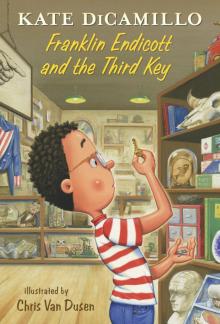 Franklin Endicott and the Third Key
Franklin Endicott and the Third Key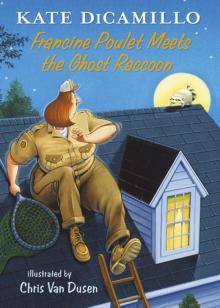 Francine Poulet Meets the Ghost Raccoon
Francine Poulet Meets the Ghost Raccoon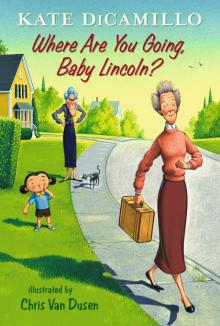 Where Are You Going, Baby Lincoln?
Where Are You Going, Baby Lincoln?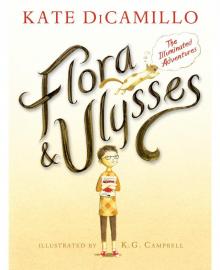 Flora & Ulysses: The Illuminated Adventures
Flora & Ulysses: The Illuminated Adventures Beverly, Right Here
Beverly, Right Here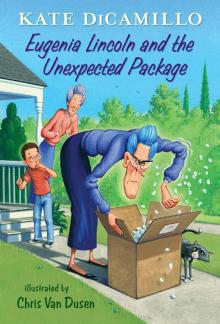 Eugenia Lincoln and the Unexpected Package
Eugenia Lincoln and the Unexpected Package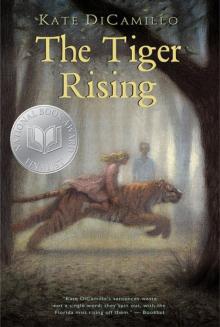 The Tiger Rising
The Tiger Rising The Beatryce Prophecy
The Beatryce Prophecy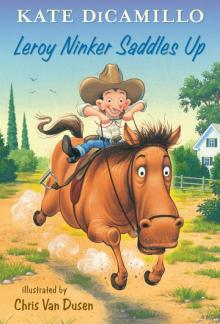 Leroy Ninker Saddles Up
Leroy Ninker Saddles Up